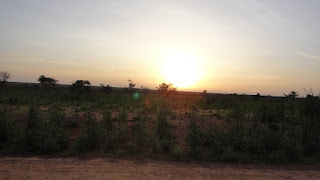There has been some encouraging news about Niger this past week. On Wednesday the Medical Journal, The Lancet published a case study about Niger reporting that there have been significant reductions in the mortality rate of children under the age of 5 between 1993-2009 based on analyzing household surveys. The authors of the study attributed it to increases in child survival interventions such as the use of insecticide treated bed nets, improvements in nutritional status, vitamin A supplementation, usage of oral rehydration salts and zinc, care-seeking for fever, malaria, and childhood pneumonia, and vaccinations. The increases in the child survival interventions have been possible because of collaborations between the government and international NGOs to increase universal access of health care for pregnant women and children by building rural health centers throughout the country, reducing the cost for maternal and child primary health care, and increasing or building the capacity of the health care work force. In relationship to it's neighbors, Benin, Burkina Faso, Chad, Mali, and Nigeria, Niger is the only country on track to achieve the Millennium Development Goal #4 (reduce by two-third the under-five child mortality rate). This is no small feat for a land-locked, resource-poor desert country that is often at the mercy of extreme crises such as famine and floods. Which is why this report from Reuters on the same day was also encouraging. The Ministry of Agriculture reported on state-owned radio that this year's harvest for millet, sorghum, and maize should be better this year, reducing the rates of food insecurity that plagued the country last year and increasing the rates of malnutrition.
When I was in the desert a month and half ago I experienced my first oasis. We would be driving along through the sand, struggling to find our way and then out of nowhere, grass would appear with a little water and a camel or two grazing. In a similar way I find this news about the positive changes in Niger to be an oasis. For months I have heard, and lately seen, the ravages of the 2011 drought resulting in emergency-levels of malnutrition, the arrival of the Malian refugees straining the resources of Nigerien rural health centers and staff, and the spillover of Muslim-Christian tension resulting in the burning of churches in the Zinder region of Niger. This news is an oasis in the midst of a food, political, and religious desert.
As I've been thinking about oasis this past week, I've been thinking about other sources of oasis. This past week it has often rained in the early part of the morning. Perhaps nothing is more refreshing in the desert than seeing the sun rise after a nightly rainfall, as I did during my morning run this past Tuesday. And, I've been attending a small church each week. Christians are by far the minority in this Muslim country and last week, despite increased threats of security, our small group gathered and found oasis in Romans 8, particularly 31, "If God is for us, who can be against us?" All of this is a reminder that God has not forgotten to provide oasis for the people of Niger. He has not forgotten the small child at the mother's breast, He has not forgotten the mother searching for food for her child, He has not forgotten the farmer struggling to harvest his millet, and He has not forgotten me and my continual search for desert oasis.
When I was in the desert a month and half ago I experienced my first oasis. We would be driving along through the sand, struggling to find our way and then out of nowhere, grass would appear with a little water and a camel or two grazing. In a similar way I find this news about the positive changes in Niger to be an oasis. For months I have heard, and lately seen, the ravages of the 2011 drought resulting in emergency-levels of malnutrition, the arrival of the Malian refugees straining the resources of Nigerien rural health centers and staff, and the spillover of Muslim-Christian tension resulting in the burning of churches in the Zinder region of Niger. This news is an oasis in the midst of a food, political, and religious desert.
As I've been thinking about oasis this past week, I've been thinking about other sources of oasis. This past week it has often rained in the early part of the morning. Perhaps nothing is more refreshing in the desert than seeing the sun rise after a nightly rainfall, as I did during my morning run this past Tuesday. And, I've been attending a small church each week. Christians are by far the minority in this Muslim country and last week, despite increased threats of security, our small group gathered and found oasis in Romans 8, particularly 31, "If God is for us, who can be against us?" All of this is a reminder that God has not forgotten to provide oasis for the people of Niger. He has not forgotten the small child at the mother's breast, He has not forgotten the mother searching for food for her child, He has not forgotten the farmer struggling to harvest his millet, and He has not forgotten me and my continual search for desert oasis.






